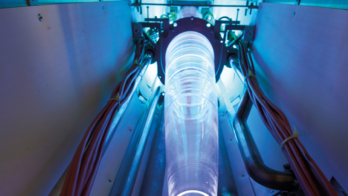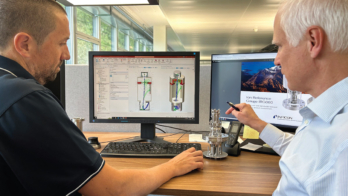A new training network benefits young researchers in the field of
hadron therapy.
Résumé
PARTNER : une formation pour l’hadronthérapie
En juin 2008, la Commission européenne a accordé 5,6 millions d’euros au projet PARTNER (Particle Training Network for European Radiotherapy), l’objectif étant de former de jeunes chercheurs sur certains aspects de l’hadronthérapie, touchant à la fois à la physique des particules et aux applications thérapeutiques. Coordonné par le CERN, ce projet, d’une durée de quatre ans, réunit 10 instituts et centres de recherche d’Europe. Il s’agit d’un réseau pluridisciplinaire exceptionnel dans lequel 25 étudiants reçoivent une formation sur des sujets allant de la physique des particules à l’épidémiologie. Au cours de la première année, le réseau a déjà organisé des formations sur les détecteurs et les accélérateurs, le travail en équipe et la radiobiologie pratique.
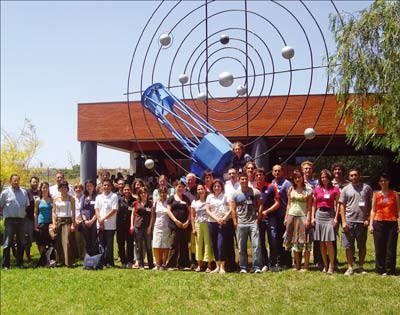
PARTNER’s training programme got off to a good start with the course on Detectors and Accelerators Applied in Medicine, which was held at IFIC, Valencia, in June 2009.
Image credit: E Dimovasili/M Dosanjh.
In June 2008 the European Commission awarded €5.6 million to the Particle Training Network for European Radiotherapy (PARTNER), with the objective of training young researchers in aspects of hadron therapy that involve particle physics and applications in medicine. Co-ordinated by CERN, the four-year project involves 10 institutes and research centres in Europe. It represents a unique multidisciplinary network in which 25 students, 4 of whom are based at CERN under the fellowship programme, receive training in fields that range from elementary particle physics through the design of gantries for hadron therapy to epidemiology. Such specially trained students are vital now that hadron therapy is becoming established as an important procedure for the treatment of cancer (CERN Courier December 2006 p24).
PARTNER’s activities got underway in October 2008 with the network’s initial meeting at CERN (CERN Courier December 2008 p6). Since then the network has designed a strategy for efficient project management and the timely distribution of the agreed deliverables, as well as having developed a training programme and recruited its key element – the researchers. The project is funded under the EC’s Marie Curie Initial Training Network (MC-ITN) scheme, which seeks to improve the career prospects of young researchers. One of the first activities for PARTNER was thus an MC-ITN Administrators Course for Marie Curie Projects, which was organized at CERN in January 2009 together with external consultants to help all of the collaborating institutes to understand what is required in the management of such projects.
A successful collaboration
The student training programme started the following June with a course on Detectors and Accelerators Applied in Medicine, held at the Instituto de Física Corpuscular (IFIC) in Valencia. The workshop provided an overview of several topics involved in the biomedical applications of detectors and accelerators, from Monte Carlo simulation and Grid computing to image science. CERN’s input into the PARTNER training programme is closely linked to its strengths not only in accelerator research but also in Grid technologies.
By adopting Grid technologies, the PARTNER project hopes to solve some of the multilayered problems of sharing data for referring patients, optimizing treatment planning and making use of the experience gained from managing databases. This involves the exchange of large diagnostic images, sharing cancer databases and merging referral systems across European borders. In this first course, the students were able to reinforce their knowledge as well as learn about new subjects. They also had the opportunity to meet each other for the first time and find out what others in the project are working on.
The second course was a workshop designed to familiarize young researchers with relevant aspects of leadership and team-building in the research environment. This took place in September at the University of Surrey and was led by David Faraday from Evolve Leadteam Ltd. The topics covered included communication, assertiveness, negotiation and time-management skills. Practical exercises and discussion groups complemented the theoretical presentations. Group activities included projects on technical problem solving, financial planning and analysis, risk assessment, product availability, implementation and construction. Those attending the workshop suggested that such a course would be valuable for all of the researchers in PARTNER, including those with more experience, because they come from differing disciplines and tend to have different skill levels.
A hands-on radiobiology course came next, held on 25–27 November 2009 at GSI, Darmstadt. This offered an introduction to radiobiology and lectures on experiment results, including topics such as DNA experiments, chromosome analysis, cell survival curves, DNA damage repair and DNA fragmentation after irradiation. In the context of the specific training offered by PARTNER, researchers also participated in the Particle Therapy Co-Operative Group Congress held in Heidelberg on 28 September – 3 October 2009 and the ESTRO course on “Radiation Therapy with Protons and Ions” held at Pfäffikon on 10–14 May 2009.
In all, PARTNER has had a successful first year. Students have given positive and constructive feedback on all of the activities and they particularly seemed to appreciate the possibility to network with students and experts in the field from all over Europe. The training programme continues in 2010, with the first course of the year, “Hadron therapy: past, present and future”. Held at CERN on 21–26 February, the course was co-organized by two medical experts from the MedAustron project and from Oxford University. Their aim is to teach what has been learnt in the past, to define clearly the relevant disciplines from physics and technology and to examine the potentials for proton- and ion-beam therapy
A valuable PARTNER
Lara Barazzuol
(Italian), Surrey Materials Institute, University of Surrey.

“The ‘Radiobiology hands-on’ training was an intensive and active time in which we all learnt a lot, actually practicing what was taught during the first session. Personally, I think it was very useful for my studies, being involved in radiobiological experiments. In particular, I have learnt new techniques that I am currently applying in my own research. Overall, I can say that the PARTNER project has immense potential to grow in the next two years, providing training that helps us to improve and develop our skills.
David Watts (British/Canadian), CERN and TERA.
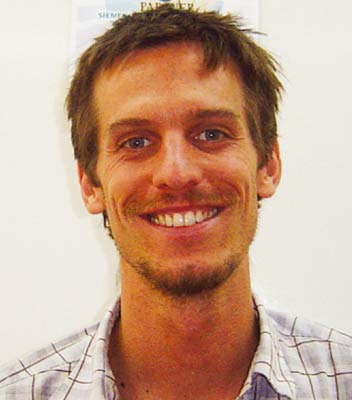
“One very positive aspect of PARTNER is that the researchers, mostly young people like myself, are encouraged to network and share ideas and tackle problems together. We are given these opportunities during training sessions and courses, and during the leadership training we began to make bonds that should help us stay in contact during our careers in the field, thus keeping open the channels of communication between biologists, physicists, computer scientists and doctors. In short, we are kept very busy with our research, we are given all the opportunities to get training within and beyond our field, and I should not forget that though we have much to do, we are having fun doing it!”
Silvia Verdu Andres (Spanish), TERA Foundation (Therapy with Hadronic Radiations).
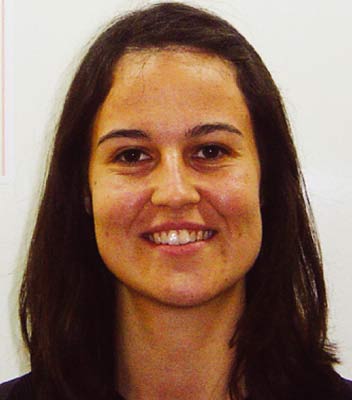
“PARTNER has succeeded in bringing together researchers from the different fields involved in hadron therapy and encouraging the exchange of knowledge between them. From a young researcher’s point of view, training is one of the most important things. The training courses have been carefully selected to introduce us to the complex world of hadron therapy and to help us become future professionals in our field, giving special importance to the way that we communicate and work in groups. Last but not least, I like PARTNER because it is composed of very enthusiastic people from all over the world who love the work they are performing for society.”
Faustin Roman (Romanian), CERN.
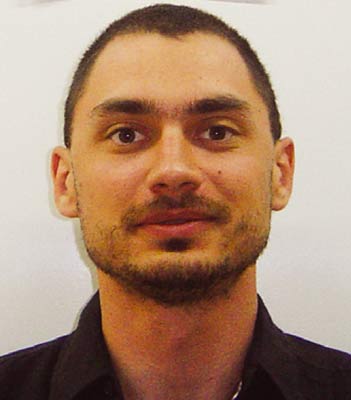
“I feel very privileged to be part of the PARTNER network because of the challenges of the project and the people involved. The programme is amazing: multidisciplinary courses, soft-skills training, practise and access to state-of-the-art technology. All of this is well organized, which says a lot about the quality of supervisors and the co-ordination of the project. Within the PARTNER project I have had the opportunity to build a software platform to share medical data. I know that by sharing medical information we can improve greatly the patient’s treatments and quality of life.”



